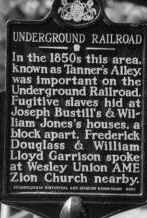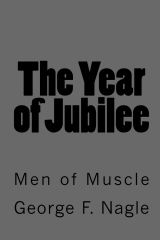
Study Areas:
Anti-Slavery
A Harpers Ferry Warning
to
Harrisburg's
African American Community
Editorial published in the Harrisburg Patriot and Union
John Brown's October 17, 1859 raid into Harpers Ferry, Virginia shocked the nation, not so much for the deaths that resulted, but because of the potential violence and social upheaval that many saw as its intent. Even though some African American leaders had known of Brown's plans and had dismissed them as foolhardy, northern blacks generally hailed the raid as a bold blow against slavery, to the shock of much of the white community. In response to these sympathies for the condemned anti-slavery leader--Brown had already been tried and found guilty at this point--the Harrisburg Patriot and Union, a Democratic newspaper, ran the editorial below, directed to Harrisburg's black residents.
The editorial takes a very patronizing attitude toward local African Americans, explaining "you should be told what this all means, and what you should do under such circumstances." It further assumes the relative passivity of local blacks by declaring "If left alone, you would not encourage such wicked efforts to excite the black race against the white race," but blames the Republican party and abolition leaders for "goading you on." Slavery and southern blacks, it argues, are not the concern of Harrisburg's African American community, which it believes must "attend strictly to yourselves and your own homes."
It concludes with the threat that local white fury would be visited upon them should they continue to applaud such actions. Despite the threat, Harrisburg blacks, like northern blacks in general, did indeed continue to uphold John Brown and his men as heroes. Public demonstrations of support for the jailed Brown, and for his family, were held in many northern towns and cities. December 2, 1859--the day of Brown's execution--was called Martyr Day by black abolitionists, and was marked by somber prayer meetings, the wearing of black crepe armbands, and the closing of many black businesses. (Benjamin Quarles, Black Abolitionists, 1969, pp. 234-244)
2
November 1859
Excitement in Virginia
To the Colored People of Harrisburg.
You
form a large portion of our population; you are supposed to sympathise
with the recent attempt at insurrection in Harper’s Ferry. It is,
therefore, proper that you should be told what this all means, and
what you should always do under
such circumstances. We speak to you on the subject because there are among
you honest and intelligent men, who deserve to have these things
explained to them.
If left alone, you would not encourage such wicked efforts to excite the black
race against the white race, and the white race against the black race, as
a short time ago resulted in the death of over a score of persons
of both colors,
but the Republican party has been so long preaching to you, and Abolitionists
have been so long goading you on, that you have commenced to think it your
duty to interfere with slavery in the southern States.
But so soon as a deed is done, you see how these very men turn against you; how
Republican newspapers denounced John Brown for attempting to put their preaching's
into practice. The reason of this is here: You are of a different race from the
great bulk of the people of America; your race is enslaved for the most part
in this country, and the comparative few who are in the northern States have
no part in the Government. You have rights which we will all defend: but as belonging
to another race, there are laws against you in every northern State. Those laws
are made for the purpose of keeping the races separate. If you improve yourselves,
gain wealth and knowledge, we will be very much pleased: and we have provided
laws according to which you may have every comfort and happiness which the whites
have, and may improve your minds in every way. When you have shown yourselves
to the whites, we think it just that you should have the political rights which
the whites have. Before that you should not have them. And those who pretend
to be your friends are not showing you the way to better your condition: for
they are talking to you about negroes in the South, with whom you have nothing
to do, when you should be attending strictly to yourselves and your own homes.
By not minding your own business, or permitting the Abolitionists to pretend
to be doing your business in the South, a great injury results to you.
It is this. All this preaching of the Abolitionists must terminate
in a terrible insurrection in the South, where many black men and many
white
men and women
and children must be killed. That will excite the white race against the black
race. You have seen how this Harper’s Ferry affair has made all the white people
angry, and you must have observed that not one white man in Harrisburg says
it was right. Well, then if it had been a serious affair, and if it had lasted
months,
while white women and white girls were being butchered in the South, what do
you think would have happened here? This white race would have become more
and more bitter, until they would have taken away some of the rights which
you now
have.
Brown Republicans may talk very much, but they are white: and when the horrible
result of their writing and speaking should be seen they would all sympathise
with their white brethren. All the whites here would be against you, and no man
can tell what they would do in their fury. You see, then, that the Abolitionists
are giving you bad advice, which may injure you very much. 1
Notes:
1. Digital transcription posted on Dickinson University's
website: http://www.dickinson.edu/ (Dickinson
House Divided Project.)
 Covering
the history of African Americans in central Pennsylvania from the colonial
era through the Civil
War.
Covering
the history of African Americans in central Pennsylvania from the colonial
era through the Civil
War.
Support the Afrolumens Project. Buy the books:
The Year of Jubilee, Volume One: Men of God, Volume Two: Men of Muscle

